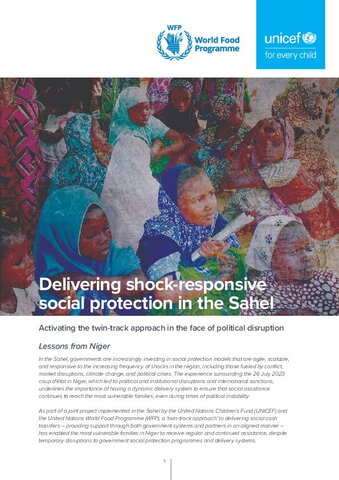
In the Sahel, governments are increasingly investing in social protection models that are agile, scalable, and responsive to the increasing frequency of shocks in the region, including those fueled by conflict, market disruptions, climate change, and political crises. The experience surrounding the 26 July 2023 coup d'etat in Niger, which led to political and institutional disruptions and international sanctions, underlines the importance of having a dynamic delivery system to ensure that social assistance continues to reach the most vulnerable families, even during times of political instability. As part of a joint UNICEF-WFP social protection project in the Sahel, a "twin-track" approach to delivering social cash transfers has enabled the most vulnerable families in Niger to receive regular and continued assistance, despite temporary disruptions to government social protection programmes and delivery systems.
